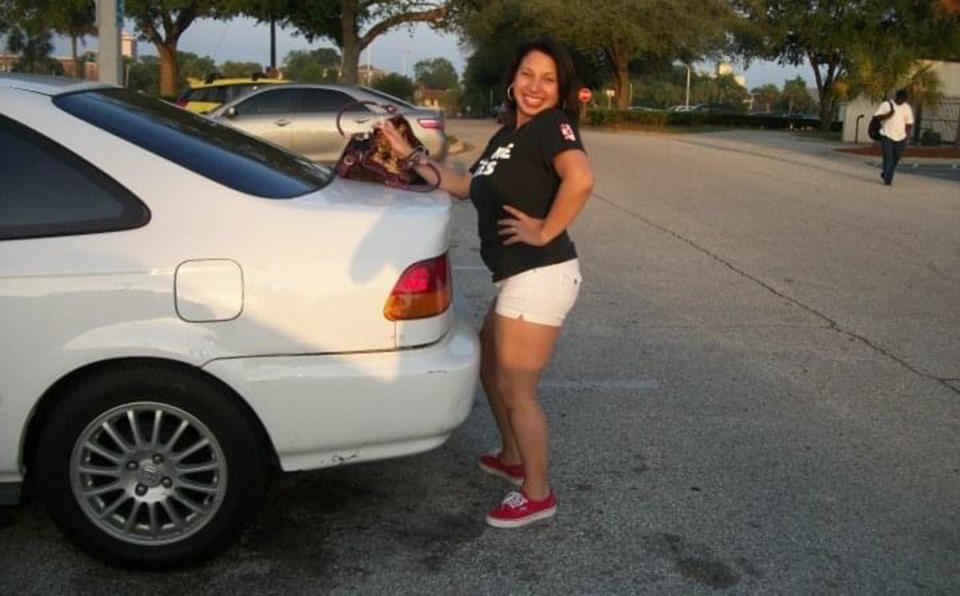Judicial Bypass And Abortion: One Woman Shares Her Story
On August 10, a Florida court ruled a pregnant, parentless 16-year-old was not "sufficiently mature" enough to decide to have an abortion.
The minor's case is not uncommon. In the 36 states that require parental involvement for a person under 18 to have an abortion, teens have an option to go before a judge instead of asking their parents.
A reported 10% of all abortions among minors are obtained through this process, according to a study published in the journal Perspectives on Sexual and Reproductive Health.
Stephanie Loraine Piñeiro, now 30 and the executive director of an abortion fund, was 17 years old and living with her parents in Florida when she found out she was pregnant. She said her Catholic OB-GYN had denied her birth control without her parents' approval.
Piñeiro had been pregnant before, when she was 16, and she told her parents about her unplanned pregnancy and desire to have an abortion.
"My dad took me (to get an abortion), but we had a very contentious relationship and he judged me and shamed me for getting an abortion," Piñeiro said. "He told me that if I got pregnant again, I'd be forced to keep it because what I was doing was wrong. I knew I couldn't tell my parents and I did not want to become a parent."

In Florida, anyone under the age of 18 cannot receive abortion services without parental consent.
Piñeiro scoured the internet for information. On one message board she learned about judicial bypass — a legal option that allows minors to request an order from a judge that lets them have an abortion without any parental involvement.
"I immediately started the process, which included calling the (abortion clinic). The clinic told me to call a hotline, so I called them for a few days before I finally got a response," Piñeiro, who still lives in Florida, explained. "The hotline gave me information for a pro bono attorney in my area."
What is judicial bypass?
Thirty-six states require parental involvement in order for a minor to obtain an abortion, whether that's notification or consent. Florida is one of the states that requires parental consent.
In 1979, the United States Supreme Court affirmed a ruling that a state cannot "grant parents an absolute veto over a minor’s abortion decision," stating that to do so would violate a minor's Constitutional rights. Instead, the Court issued an alternative known as a judicial bypass.
"If you can't get your parents' permission, or your parent or guardian isn't in your life, you actually can go and speak with a judge," Rosann Mariappuram, executive director of Jane's Due Process, a Texas-based nonprofit organization of lawyers who provide free legal services to minors seeking abortions, told TODAY.
"That's what judicial bypass or bypass order is," she added. "It's really permission from the judge saying that even though you're under 18 you can consent to health care."

A group called the American College of Pediatricians that opposes abortion argues that minors are in "need of adult guidance" and so states should require parental involvement. The group argues that the risk of violence from parents is overstated.
According to the American Civil Liberties Union (ACLU), the American College of Pediatricians had about 60 members in 2009 and was formed after the American Academy of Pediatrics, which has about 60,000 members, voiced support for same-sex marriage. The larger AAP also supports minors' access to abortion care.
TODAY reached out to the American College of Pediatricians and did not get a reply.
"One of the first things people think when they hear 'parental involvement' is, 'Oh, that's a good thing you should tell your parents,'" Mariappuram said. "Unfortunately, this entire process is traumatizing and scary."
One 2018 study published in the Journal of Adolescent Health found that while judicial process was “implemented to protect adolescent from alleged negative emotional consequences of abortion,” the process causes “emotional harm through unpredictability and humiliation” and may have “negative consequences for adolescent health.”
Because minors are involved in judicial bypass, the court proceedings are private and the teens’ names are redacted for their protection.
Mariappuram said judge's questions can be wide-ranging.
"They tend to ask about family structure; how the teen got pregnant; their grades and how they're doing in school; what their plans are," she added. "In particular, they ask if the teen has met with a doctor or met with a health care provider; do they understand how pregnancy works and how they got pregnant? They also ask if they understand how abortion works and how carrying a pregnancy to term works. So a lot of medical information is being asked of teens, which is really hard because not everyone has access to sex ed."
Currently, 29 states mandate sex education, according to the sex education advocacy group Sex Ed For Social Change. Thirty-five require teachers to stress abstinence-only sex ed, and only 16 states require instruction on condoms or contraception when sex ed is offered.
“Most young people we work with have never been to court before," Mariappuram added. "They inherently think they're breaking the law."
Why do some minors go to court?
Mariappuram said the vast majority of teens do involve a parent in their reproductive health decisions.
"If you look at the number of teens who get abortions in a state, it's several thousand usually," she added. "There's a tiny, smaller population of teens who go through this process."
The most common reason teenagers go to a judge, she said, is they're afraid for their safety if they tell their parents they need an abortion. Most of her clients have been told they'll be kicked out of the home if they get pregnant, she said. Sometimes they know their parents oppose abortion and they don't want to ruin their family relationships by asking for legally required consent.

A smaller number of clients, Mariappuram said, are in foster care or don't have a parent or guardian who can consent; for example, unaccompanied immigrant minors in federal custody. Some teens, like the girl at the center of the current Florida case, have a supportive adult in their lives but don't have a legal guardian who can legally consent to the procedure.
Preparing to plead her case
In 2009, Piñeiro went before a judge to ask for an abortion.
Beforehand, she gathered all the documents she needed to show, including her high school and community college transcripts, police records involving the family, an ultrasound of her pregnancy and an essay she wrote describing what she wanted to do with her life.
"I remember it wasn't in a courtroom, it was in a judge's chambers," she recalled. "The judge was at the head of the table, and I was on the other end of the table with my lawyer."
Piñeiro said she thinks the entire conversation with the judge lasted less than an hour, and in the end the judge granted her permission to obtain an abortion and handed her a court order.
"I remember being told, 'This piece of paper — you hold onto this paper with your life. Do not lose it," Piñeiro recalled. Two days later, she took the order to a nearby clinic and had a surgical abortion. She used the three weeks it took for her to obtain a judicial bypass to save up money to pay for the procedure.
"Afterwards, I drove home to my parents' house and acted as if nothing had happened," she added. "I was helping my mom cook and peel potatoes. I didn't rest — I had to pretend and just move on. I didn't have very many friends at the time ... I was very much alone."

While Piñeiro said she does not regret her abortion, she said after her procedure she felt "shame" and felt like she needed to work "two, three, four, five times harder" because she had been pregnant.
"I ended my pregnancy and that meant that I had to make my life worth living, because otherwise what was the point of going through everything?" she explained.
Three years later, she graduated with two bachelor's degrees from the University of North Florida. By the time she was 23, she got her Master's degree in social work and became a social worker. Since then, she's been involved in the reproductive justice movement, and she's now the executive director of a statewide abortion fund in Florida.
Looking back, Piñeiro believes her judicial bypass was "a very poignant moment in my life for both good and not-so-good reasons."
"I'm proud as hell of 17-year-old me, who really just figured it out and just did the thing. I was advocating for myself, my future and was very clear about what I wanted for my life," she said. "The trauma that I experienced was not from my actual abortion, it was from the state forcing me to go through something that I didn’t have to go through to get health care. That’s what’s frustrating."
"I feel like in many ways, the system failed me," she added. "It made it so that I literally had to go to a judge to make this decision. But I’m proud that I’m here to talk about it — I just shouldn’t have had to go through that."
Related video:

